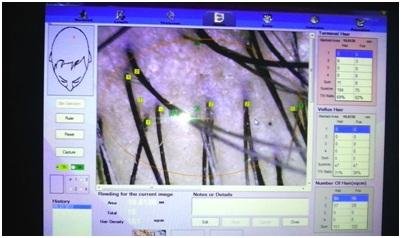- Home
- About Us
- Hair Treatment
- Hair Transplant
- Hair Loss
- Causes of Hair Loss
- Clinical Features
- Laboratory Test
- Medical Treatment
- Cyclic Treatment
- PRP
- Laser Treatment
- Surgical Treatment
- FUE
- Robotic
- FUT
- Beard Reconstruction
- Moustache Reconstruction
- Eyebrow Reconstruction
- Side Burn Reconstruction
- Complications Of Hair Transplant
- Alopecia Areata
- Telogen Effluvium
- Cosmetic Surgery
- Plastic Surgery
- Gallery
- Blogs
- Contact Us
Laboratory Test

Laboratory Test:
Laboratory workup is usually not required in men and women with AGA unless there is concomitant diffuse hair loss.
A genetic test can be done (HairDX).


Androgenetic alopecia (AGA), commonly known as male or female pattern baldness, is a prevalent form of hair loss that affects millions of people worldwide. While AGA is typically diagnosed based on clinical evaluation and medical history, laboratory testing may be recommended in certain cases, particularly when there is concomitant diffuse hair loss or when genetic factors need further clarification. This comprehensive guide explores the role of laboratory testing in the diagnosis and management of AGA, including the use of genetic tests such as HairDX.
Understanding Androgenetic Alopecia
Before delving into laboratory testing, it’s essential to understand the basics of AGA. This condition is characterized by progressive hair thinning and loss, typically occurring in a predictable pattern. In men, AGA often results in a receding hairline and balding at the crown, while in women, it typically leads to diffuse thinning of the hair on the crown and top of the scalp. AGA is primarily influenced by genetic factors and the effects of androgens (male hormones) on hair follicles.
When is Laboratory Testing Needed?
In most cases of AGA, laboratory testing is not required for diagnosis, as the condition can be readily identified based on clinical presentation and medical history. However, there are certain situations where laboratory workup may be warranted:
- Concomitant Diffuse Hair Loss: If a patient presents with AGA along with diffuse hair loss or other signs of systemic disease, laboratory testing may be necessary to rule out underlying medical conditions such as thyroid disorders, iron deficiency anemia, or hormonal imbalances.
- Evaluation of Genetic Factors: In some cases, particularly when there is uncertainty about the underlying cause of hair loss or when there is a strong family history of AGA, genetic testing may be recommended to assess the individual’s risk of developing the condition or to guide treatment decisions.
Laboratory Tests for Androgenetic Alopecia
- Complete Blood Count (CBC): A CBC may be performed to assess for signs of anemia, which can contribute to hair loss. Iron deficiency anemia, in particular, is associated with telogen effluvium, a form of temporary hair shedding that can mimic AGA.
- Thyroid Function Tests: Thyroid disorders, including hypothyroidism and hyperthyroidism, are known causes of hair loss. Thyroid function tests, such as TSH (thyroid-stimulating hormone), free T3, and free T4, may be ordered to evaluate thyroid function and assess for abnormalities.
- Hormone Levels: Androgens, including testosterone and dihydrotestosterone (DHT), play a crucial role in the pathogenesis of AGA. While routine hormone testing is not typically necessary for diagnosis, specific cases may warrant evaluation of androgen levels, particularly in women with signs of hyperandrogenism (e.g., hirsutism, acne).
- Genetic Testing (HairDX): HairDX is a genetic test that assesses an individual’s risk of developing AGA based on the presence of specific genetic variants associated with the condition. This test can provide valuable information about a person’s likelihood of experiencing hair loss and may help guide treatment decisions, such as the use of medications like finasteride or minoxidil.
HairDX Genetic Testing
HairDX is a proprietary genetic test developed specifically for assessing the risk of AGA. The test analyzes DNA samples obtained from a cheek swab to identify specific genetic markers associated with the condition. These markers, known as single nucleotide polymorphisms (SNPs), are located within genes involved in hair follicle development and androgen metabolism.
The results of the HairDX test provide individuals with a personalized risk assessment for AGA, ranging from low risk to high risk, based on their genetic profile. This information can help individuals make informed decisions about hair loss prevention and treatment options, including the use of topical or oral medications and hair transplant surgery.
Our Services
- Hair Loss
- Causes of Hair Loss
- Clinical Features
- Laboratory Test
- Medical Treatment
- Cyclic Treatment
- PRP
- Hair Transplant
- Surgical Treatment
- FUE
- FUT
- Beard Reconstruction
- Moustache Reconstruction
- Eyebrow Reconstruction
- Side Burn Reconstruction
- Complications of Hair Transplant
- Alopecia Areata
- Telogen Effluvium
- Laser Treatment



 Book an Appointment
Book an Appointment